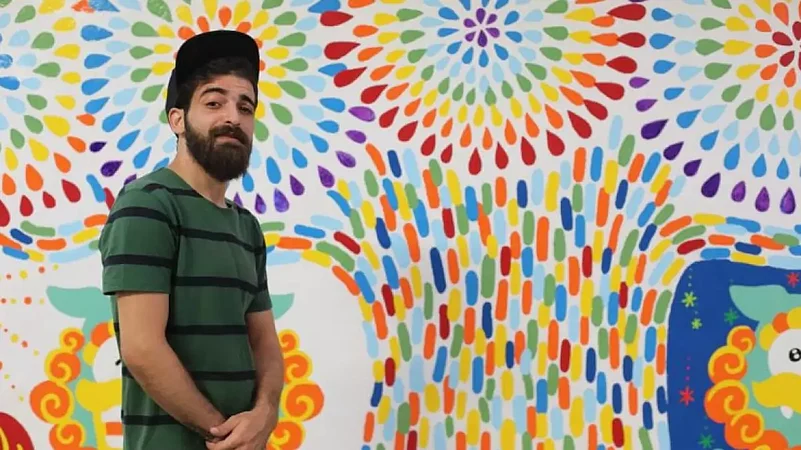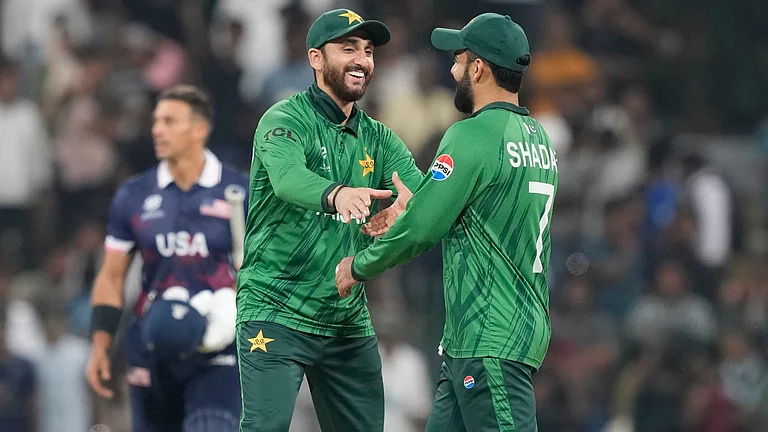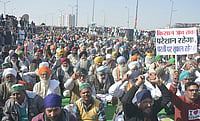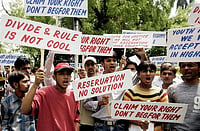Wars and conflict are not new to Palestinians in the Gaza Strip. From the Arab-Israel War of 1948 to the many wars over Gaza and Intifadas, generations of Palestinians have lived through several rounds of destruction and displacement. Yet the ongoing Israeli War on Gaza is unlike any in recent memory.
This feels like a systemic genocide, says Palestinian singer and painter Ibrahim Ghunaim, who is better known by his stage name ‘MC Gaza’.
“I have lived through four wars before this, but this feels like a systemic genocide. Israel shows no regard for any international law. They have bombed everything, making every inch of Gaza perilous,” says Ibrahim, who has been called the ‘Eminem of Gaza’.
While journalists write the first rough drafts of history and historians come much later to document official histories, artists document the conflict in real-time with their art — songs, poems, paintings, sculptures, or even their silence. For artists in the war zones, it is deeply personal. It is their homeland whose pain they are bringing to the world with their art.
Ibrahim has shot songs amid gunfire and has braved the conservatives in his homeland as well as the Israeli hostilities. His songs over the years have brought the stories of Palestine beyond the nationhood movement. He has also sung and spoken about the aspirations of the youth in a conservative society and featured unorthodox motifs like parkour. His medium is rap — the radical musical format that has emerged as the preferred outlet of the oppressed’s rage and a call for change the world over. His song ‘My Extraordinary Homeland’ features a parkour park destroyed in the 2014 war. The lyrics go like this: “One martyr gives way to another, a crying widow stands next to a prisoner’s wife whose injured daughter is trying to put on her holiday clothes but she can’t.” Another song ‘If I Knew’ indicts the Palestinian leadership and another ‘diss’ song aims at his detractors.
In all of this music, the Palestinian cause remains central, says Ibrahim.
“Art in Palestine has always been a weapon we use to speak out and express what is happening. The occupation has continuously targeted and assassinated artists, writers, and individuals conveying messages and ideas to the world. This is not only happening now in the ongoing conflict but has been the case since the beginning of the occupation. Art in Palestine is also a dangerous endeavour,” says Ibrahim, adding that Palestine is the first inspiration for his art.
Ibrahim adds, “My country and its cause have played the primary role in my activities and art from the beginning until now. It is the first inspiration, the constant support, and the initial embrace. My country taught me to do the impossible from nothing. We have lived under siege and in wars for many years, yet we continue to create, sing, dance, write poetry, draw, and live. We live the life we deserve.”
A rapper for much of his artistic career, Ibrahim has taken to digital art since October 7. His digital art depicting the destruction in Gaza and its many stories have attracted thousands of reactions to each post on his Instagram account. He says he was never an artist but was always a thinker and his digital art is part of telling the truth to the world.
“I am not primarily a painter. I have been a thinker, writer, and rapper for 18 years with hundreds of contributions worldwide. I started drawing with artificial intelligence a month ago, a field that relies more on thinking and writing than anything else. In this war, we have something different, almost the entire world is with us. We have reached the world and conveyed the truth to them, which is one of the best things that has happened in the history of our Palestinian cause. Artists have participated significantly through expressive forms such as drawing, music, and various forms of protest,” says Ibrahim.
With Christmas around the corner, Ibrahim portrays Christmas in the ruins of Gaza and the Palestinian children writing to Santa Claus amid the war. In one video, a tired Santa sits in a graveyard and reads letters from Palestinian children writing to him about the basic amenities needed in the winter during the war — around 1.9 million Palestinians in Gaza have been displaced and large swathes of the neighbourhoods have turned into wastelands. In a post, he paints the blindfolded Statue of Liberty standing atop dead babies with a burning city in the background — an indictment of the US role in the war. In another, he depicts Jesus in a kaffiyeh — a chequered kerchief that’s come to symbolise the Palestinians.
Despite all the hardships, Ibrahim says Palestinians are not going anywhere. He rejects comments that the current war is another ‘Nakba’ — the displacement of Arabs in 1948.
“People have moved from one area to another within the same place. It can never be compared to the Palestinian Nakba. They relocated after extremely violent massacres carried out by the occupation. The people of Gaza will not leave Gaza even if they are all killed,” says Ibrahim.
Ibrahim is not just an artist. He is a Palestinian artist. The war is personal. The toll is his own. He says he has lost his brother-in-law and many friends and relatives. None of this is going to come in the way of being the voice of Palestine, says Ibrahim.
“My view as an artist is my view as a citizen and as a human. I will continue to live, act, and create art until my country is liberated from the killers of children and the apartheid state of Israel. Whether it happens today, tomorrow, or a hundred years from now, we will die, and our children will live. Our words will tell the world that a people fought for freedom in a land deserving of it,” says Ibrahim.


























